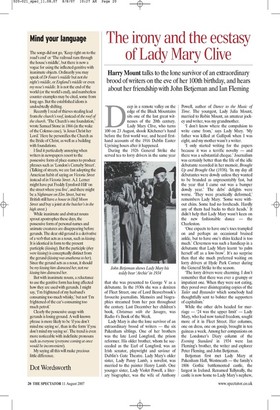Mind your language The songs did not go, 'Keep right
on to the road's end' or 'The railroad runs through the house's middle', but there is now a vogue for using the inflected genitive with inanimate objects. Ordinarily you may speak of Dr Foster's middle but not the night's middle, or England's middle or even my nose's middle. It is not the end of the world (or the world's end), and numberless counter-examples may be cited, some from long ago. But the established idiom is undoubtedly shifting.
Recently Tread of thieves stealing lead from the church's roof, instead of the roof of the church. 'The Church's one foundation,' wrote Samuel Stone in 1866 (in the wake of the Colenso case), 'is Jesus Christ her Lord.' Here he personifies the Church as the Bride of Christ, as well as a building with foundations.
I find it particularly annoying when writers in newspapers resort to the possessive form of place-names to produce phrases such as 'London's Camaby Street'. (Talking of streets, we are fast adopting the American habit of saying on Victoria Street instead of in Victoria Street. A.J. Lerner might have put Freddy Eynsford-Hill 'on the street where you live', and there might be a Nightmare on Elm Street, but we British still have a house in HalfMoon Street and buy a joint at the butcher's in the high street.) While inanimate and abstract nouns sprout apostrophes these days, the possessive form of personal names and animate creatures are disappearing before gerunds. The dear old gerund is a derivative of a verb that acts as a noun, such as kissing. It is identical in form to the present participle (kissing). But the participle (they were kissing) is conceptually distinct from the gerund (kissing was anathema to her). Since the gerund acts as a noun, it should be my kissing him distracted her, not me kissing him distracted her.
But with inanimate nouns, a reluctance to use the genitive form has long affected how they are used with gerunds. I might say, 'I'm frightened of my husband's consuming too much whisky,' but not 'I'm frightened of the car's consuming too much petrol.'
Clearly the possessive usage with gerunds is losing ground. A well-known phrase is more likely to be if you don't mind me saying so', than in the form if you don't mind my saying so'. The trend is even more noticeable with indefinite pronouns such as evoyone (evelyone coming at once would be inconvenient).
My saying all this will make precious little difference.
Dot Wordsworth









































 Previous page
Previous page